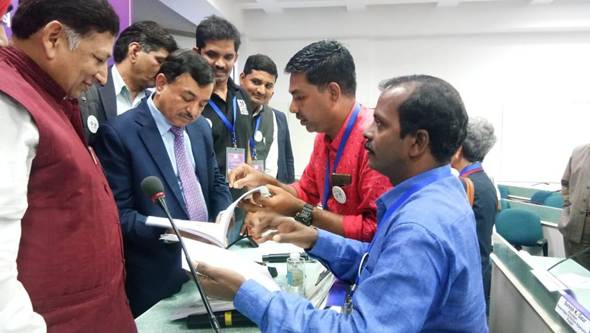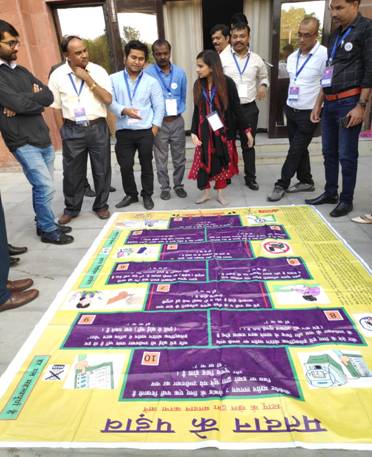ECI organizes Orientation Programme for Civil Society Organizations on Electoral Literacy Clubs
The 2 days workshop/orientation programme on Electoral Literacy Clubs (ELCs)for Civil Society Organizationsfrom 24 States and UTs and State Level Master Trainers from Maharashtra and Haryana was organized on 28-29thNovember, 2019 at United Service Institution of India, New Delhi. After Lok Sabha Election 2019, it was decided to conduct workshops to take a feedback from the Civil Society Organizations working on the grassroots level for Voter Awareness and reaching out to voters through ELCs.
The workshop was attended by 53 participants from across the country and each member got the opportunity to share his/her experiences that sought to highlight Impact Assessment in Recent Elections, Experiences from the Field, Feedback and the Way Forward. The collective inputs were further presented to Election Commissioner Sh. Sushil Chandra and Secretary General Sh. Umesh Sinha along with other senior officials of the Commission.
Election Commissioner, Sh. Sushil Chandra thanked the participants for their efforts in the field and said, ‘Today I felt so good after hearing the contributions, the volition and the work that you have done voluntarily for the democracy. The historic voter turnout is the culmination of the continuous efforts of various stakeholders. Even after achieving a historic feat, we still have challenges and that can be solved only through continuous efforts. Youngsters are the reservoirs of energy. Students in colleges are most important because they are our youngest voters. College ELCs should empower them with knowledge on importance of their role and responsibilities to vote.”

A CSO participant presenting their work to the Commission
He further emphasized that in all the Polling Booths in the country, the message should go that ink is of utmost importance and it should be delivered in the language of the people. He urged the CSO partners to identify the problems and critical gaps and give their suggestions to the Commission for enhancing voter’s participation in the forthcoming elections.
Addressing the special session of the workshop, Secretary General, Sh. Umesh Sinha said, “Through the establishment of Electoral Literacy Clubs, we are trying to sow a seed that will grow and act as a lamp of electoral awareness to dissipate the darkness of electoral ignorance. I believe, elections are the bedrock of democracy and in the edifice of democracy, every voter is like a brick. Your right to vote is not only a right –it is equally an important responsibility that contributes to making of the nation. “It is very important that people feel responsible enough and participate in every election. Sh. Umesh Sinha directed the SVEEP division to compile the feedback and suggestions given by the CSOs & other participants and present it for the consideration of the Commission.

Participant s engaging in a floor game activity for ELCs, Matdaan Ke Padaav
Background Note on ELCs
Under its flagship programme ‘Systematic Voters’ Education & Electoral Participation’ (SVEEP), the project for Mainstreaming of Electoral Literacy through Educational Institutions/ Organizations was introduced which envisages setting up of Electoral Literacy Club in every educational institution and ChunavPathshala at every booth to cover those outside the formal education system. Launched on 8th National Voters’ Day on 25th January, 2018, ELCs shall serve as a vibrant hub of Electoral Literacy for developing and strengthening the culture of electoral participation through hands on experience. Till now 5,80,620 ELCs have been established across the country.
The entire project revolves around keeping voter education relevant and practical through a host of co-curricular and extra-curricular methods for the young and future voters. The ELCs and ChunavPathshala activities are conducted by the Convener using a resource Guide where step by step instructions are given for conducting each activity. Separate Resource books have been developed for Class IX to XII, colleges and communities. A calendar of activities in a year has also been indicated. A total of 6-8 activities, with specific learning outcome, running into approximately 4 hours in all, have been identified for each category.
The Commission’s endeavor is to make the ELC project sustainable and to achieve its vision of establishing ELCs in all secondary and senior secondary schools, colleges and universities, polling stations, government and non-government organisations and corporates. Electoral Literacy Clubs are envisioned as the biggest electoral literacy movement in the world through which we can fulfill the aim of ‘No Voter to be Left Behind’.
*******
RCJ/MR/AC